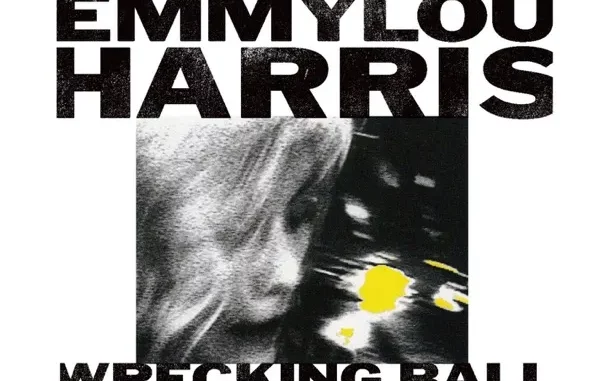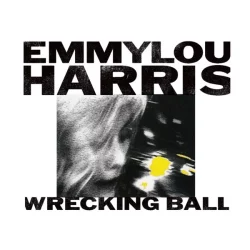
 Released in 1995, ‘Wrecking Ball’, was Emmylou Harris’ eighteenth studio album in a career that stretched all the way back to 1969. The intervening 26 years had seen Harris establish herself at the very forefront of the new country-rock scene, initially with her association with Gram Parsons, and in particular the seminal album that was ‘Grevous Angel’, and then after Parsons’ untimely death picking up the baton and using his vision as a template for such classic albums as ‘Pieces Of The Sky’ (1975), ‘Elite Hotel’ (1975), and ‘Luxury Liner’ (1976). The early eighties saw a musical shift towards bluegrass, again to critical acclaim but as the decade unfolded she found herself falling out of favour with country radio as well as the music press with her albums now struggling to maintain either the consistency or sense of direction of her previous work.
Released in 1995, ‘Wrecking Ball’, was Emmylou Harris’ eighteenth studio album in a career that stretched all the way back to 1969. The intervening 26 years had seen Harris establish herself at the very forefront of the new country-rock scene, initially with her association with Gram Parsons, and in particular the seminal album that was ‘Grevous Angel’, and then after Parsons’ untimely death picking up the baton and using his vision as a template for such classic albums as ‘Pieces Of The Sky’ (1975), ‘Elite Hotel’ (1975), and ‘Luxury Liner’ (1976). The early eighties saw a musical shift towards bluegrass, again to critical acclaim but as the decade unfolded she found herself falling out of favour with country radio as well as the music press with her albums now struggling to maintain either the consistency or sense of direction of her previous work.
Had Harris chosen at this point to walk away from the industry her place in the pantheon of country music was already secured. However, though she was now into her fourth decade as a recording artist and reduced to walking in the shadows of lesser lights, Harris had no intention of fading away. Instead, by employing the services of legendary alternative-rock producer Daniel Lanois, along with a stellar cast of supporting musicians and an eclectic choice of songs from some of the greatest songwriters of our time including Bob Dylan, Jimi Hendrix, Neil Young, Steve Earle, and Lucinda Williams she recorded ‘Wrecking Ball’ and in doing so reinvented her sound and created an album that has gone on to be considered one of the most influential in establishing the americana music genre.
The album opens with ‘Where Will I Be’, written by Lanois that quickly sets the musical landscape, rich in atmosphere, whilst hauntingly dark in it’s complexity the song is carried along by the rattling roll of Brian Blade’s snare drum. This is followed by Steve Earle’s ‘Goodbye’, on which his acoustic guitar playing along with Larry Mullen Jr on drums supply the conduit that helps lift this song way beyond what it achieved in its original form on ‘Train a Comin’ (1995), in most part because of Harris’ flawless vocal delivery. Next up is ‘All My Tears’, a song written by Julie Miller that Harris was very familiar with having shared vocal duties on Miller’s album ‘Orphans and Angels’ (1993), released a few years earlier. One can’t help but wonder whether, even though Lanois was very much pulling the strings on what material was covered on the album, this song in particular was very much Harris’ choice, for here she sings with an utter fearlessness, as if consumed by some spiritual being. This is followed by the title track to the album, a song written by Neil Young on which he also supplies backing vocals. Here Lanois creates his most sonic soundscape as Harris’ gossamer vocal shimmer and swirl in some seductive aural dance, shorn of her country foibles and instead revelling in her new role, as if this was the album she’d been waiting her whole life to make.
It is with that thought along with the advantage of hindsight that renders the review written at the time of its release by esteemed music critic Robert Christgau as somewhat redundant as he implied “Harris has no vision of her own for Lanois to ruin”. Future releases by Harris without the help of Lanois, in particular ‘Red Dirt Girl’ (2000), would continue in the same musical vein with equal success, and though it could be argued that Harris had simply taken the template from Lanois and run with it in the same way she did with Parsons twenty years earlier, as she proved back then, you still have to deliver the goods, and she certainly did that.
Close friend, Anna McGarrigle supplies the next number with ‘Goin’ Back To Harlan’, that Harris immediately claims as her own with her lucid vocal delivery and acute phrasing embodying the very soul of the classic piece of songwriting. This is followed by ‘Deeper Well’, a song written by David Olney, another writer who’s work Harris was familiar with having covered his ‘Jerusalem Tomorrow’, on her previous album ‘Cowgirls Prayer’ (1993). Here the song is credited to both Olney and Lanois and though the lyrics have been slightly tweaked and Lanois’ arrangement is drawing from a much broader palette of which Olney could only have dreamed of, it is fundamentally the same song. The one significant difference is again Harris’ delivery. The pristine vocals that for four decades had been delivering notes that even the songbirds themselves would have been jealous of was now reaching deep into the pit of her stomach for a sound that was almost primal. The song itself is very pivotal to the albums overall sound coming as it does in the middle, it acts as the core to which each track is subtly connected. Dylan is the proprietor of the next track ‘Every Grain Of Sand’, written during his Christianity period, but here Harris replaces the religious aspect with something more spiritual whilst multi instrumentalist Malcolm Burn delivers some gorgeous organ playing that softens Mullens abrasive percussive urgency.
Much of the success of this album is due to how the songs thematically relate, and even though they’re crafted from some of the finest in their trade they have been written by artists at varying different stages of their career over the previous four decades. Thus, in delivering an album that has Dylan alongside an, at the time, lesser known Williams, or Young next to an equally lesser known Miller or towards the end of the album Hendrix followed by a very much unknown Gillian Welch, Harris has inadvertently produced a time machine that seamlessly links the songwriting giants of the sixties and seventies to the current crop of literate singer songwriters and thus creating a platform for their talents to be more easily discovered.
The album continues with Williams ‘Sweet Old World’, now recognised as an americana classic, only a few at the time were aware of the original version. Here Harris is carefully not to stray, especially with Williams supplying the acoustic guitar, while Young’s plaintive harmonica solo perfectly captures the sense of bereavement. The somewhat surprise package among the tracks chosen is Hendrix’s ‘May This Be Love’, but where as the previous song stuck close to the original here structurally the song is taken apart. True, Lanois’ offers up plenty of feedback from his guitar but the pace is more languid and atmospheric. The tempo changes on Welch’s ‘Orphan Girl’, with Lanois’ jaunty mandolin playing offering a certain juxtaposition to the lyrical narrative for a song that the following year would open Welch’s debut album, before going on to win Best Contemporary Folk Album at the 1997 Grammy Awards. It would be hard not to believe that the exposure of having a track on this album didn’t in some small way help the success of ‘Revival’. The penultimate track from the album is another written by Lanois, and though there is a tendency to focus his contribution purely on the production and arranging, the truth is that his songs on this album hold their own against anything on offer. With ‘Blackhawk’, Lanois taps into the very essence of what makes Harris tick as here she simple soars, plucked from the safe ground of country ballads to the uncertain idiosyncrasies of a new age genre flying high with a new confidence, and a new direction.
The last track fittingly finds Harris singing with her soulmate, Rodney Crowell, on a song they wrote together entitled ‘Waltz Across Texas Tonight’. Fittingly because Crowell had been there very much at the beginning, playing in her band in the mid-seventies and writing some of her best known songs. With having Crowell alongside her during this transition Harris could be confident she wasn’t making this journey on her own. In truth not everyone would want to share the ride, Country music hated the album, but none the less it would go on to win Best Contemporary Folk Album at the Grammys, garnering rave reviews from almost all quarters of the music press. Today it is rightly seen as a touchstone album for the americana music genre, a pioneering album that didn’t only turn the spotlight on a new burgeoning songwriter scene but in itself became a template that so many artists of the twenty-first century would draw from. If ever an album deserved the phrase ‘Classic Americana Album’ then this is surely it.



I’ve been a fan since I first heard her sing “We’ll sweep out the Ashes ..” from GP back in 72/73. I was in the audience at the New Vic London ’75 when I was mesmerised by her voice (& beauty) and couldn’t believe I was a mere few yards away from legends Glen D, James Burton, Hank DeVito and a young whippersnapper called Rodney Crowell. This was country/rock at its thrilling best. Fast forward twenty years; I’m still on a diet of “Everytime You Leave”, “If I could Only Win ..” etc when I bought this in ’95. First thought, before hitting the play button was “who are these guys?” Buddy Miller? Brady Blade? (didn’t realise his first name was Brian!). Wow – what a listen; but what a leap! Fast forward a few months when I found myself in Cambridge Corn Exchange to see her & these new guys in action supporting the new album. Sold out crowd. Expectant. An absolute triumph; I’m still whooping for another encore nearly 30 years later. Brady Blade on drums was a revelation.
And yet …. I remember this vividly …. a sizeable % of the audience who obviously hadn’t caught up with “Wrecking Ball” were polite, but lukewarm in their applause. They were clearly devotees of Emmy’s talent and music and came alive only when she did dip into her back catalogue. As “they” say, an album clearly ahead of its time. Eternally grateful I was there!
Glad you enjoyed the review Alan. Got to say though that your recollections have left me more than a little jealous, in fact I can’t remember the last time I felt so jealous that I may have to ban you from mentioning this information ever again😀.